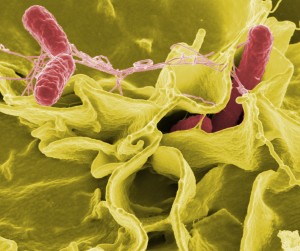WEDNESDAY, 17 APRIL 2013
A common misinterpretation of this theory is that high levels of relatedness are crucial for altruistic behaviours to evolve. However, the Kin-Selection theory states that the evolution of altruism depends on the costs that the affector faces, the benefits that the recipient gains, and on the level of relatedness between them. Therefore, altruistic behaviour can theoretically evolve between individuals that don’t share many of their genes if the costs of behaving altruistically are very low compared to the benefits that the recipient gets.Dominik Refardt and colleagues have experimentally shown that this is what happens when E.coli bacteria infected with a lethal fage commit suicide to protect nearby bacteria. An infected bacteria has very little to lose from committing suicide as its chances of reproduction after being infected are basically zero, whereas the benefits that other bacteria in the colony receive by its suicide are very high, as it can protect the colony from future infection. This suicidal behaviour occurs even at very low levels of relatedness between them. The challenge now is to understand how widespread altruistic behaviour between individuals with low relatedness is across different taxa.
doi.org/10.1098/rspb.2012.3035
Written by Ornela De Gasperin Quintero.

